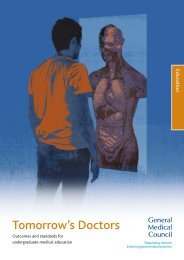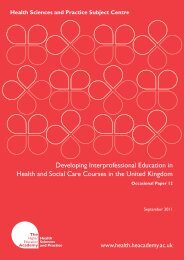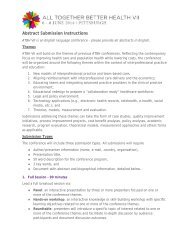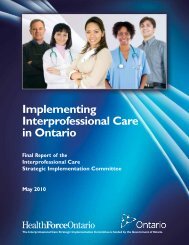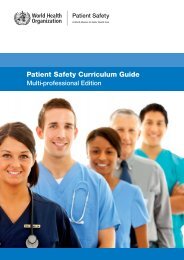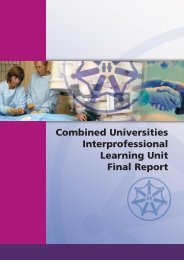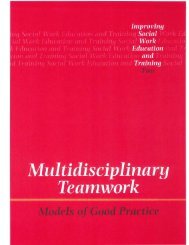Health and Social Care Policy and the Interprofessional ... - CAIPE
Health and Social Care Policy and the Interprofessional ... - CAIPE
Health and Social Care Policy and the Interprofessional ... - CAIPE
You also want an ePaper? Increase the reach of your titles
YUMPU automatically turns print PDFs into web optimized ePapers that Google loves.
protection’ (p7). Significantly <strong>the</strong> Group also recommends that ‘employers<br />
should invest more in <strong>the</strong> workforce, in order to increase people's capacity to<br />
adapt to new work organisations <strong>and</strong> circumstances’ (p23).<br />
New jobs <strong>and</strong> new roles are emerging due to changes in society such as an<br />
increased concern for <strong>the</strong> environment; living <strong>and</strong> working in a multicultural<br />
society; an underst<strong>and</strong>ing of learning as a life long activity from cradle to<br />
grave; diversifying health services <strong>and</strong> a dawning realisation that health <strong>and</strong><br />
social care are inextricably linked. Opportunities to forge closer partnerships<br />
<strong>and</strong> networks in order to implement innovative practice are to be encouraged<br />
as <strong>the</strong>se ‘can lead to productivity gains which are more based on value<br />
adding as against labour saving’ (p26).<br />
To equip people for new ways of working <strong>the</strong> Group identifies <strong>the</strong> need to<br />
address two different kinds of skills gaps: basic competences embedded in all<br />
qualifications <strong>and</strong> occupational profiles (p26).<br />
The Group clustered <strong>the</strong> competences required into three:<br />
1. Personal competences: learning to learn; team working; networking;<br />
creativity; entrepreneurship; leadership; defining a project.<br />
2. Technical competences: PC user; Internet user; telecommunications<br />
user; environment-friendly behaviour.<br />
3. Theoretical competences: foreign languages; European <strong>and</strong> global<br />
citizenship; scientific developments; underst<strong>and</strong>ing cultural diversity.<br />
In Chapter 2, The UK <strong>Policy</strong> Agenda, <strong>the</strong> links between this EU work <strong>and</strong> <strong>the</strong><br />
UK Agenda for Change (AfC), Knowledge <strong>and</strong> Skills Framework (KSF) <strong>and</strong><br />
National Occupational St<strong>and</strong>ards (NOS) are explored.<br />
Calling for <strong>the</strong> acquisition of broad basic skills <strong>and</strong> an ability to adapt <strong>and</strong><br />
learn <strong>the</strong> Group linked this with <strong>the</strong> need for life-long learning <strong>and</strong> personal<br />
development opportunities. A subsequent policy recommendation returned to<br />
this <strong>the</strong>me emphasising <strong>the</strong> need to support <strong>the</strong> creation of networks of<br />
services validating <strong>and</strong> certifying <strong>the</strong> outcome of informal learning activities<br />
(p49).<br />
While <strong>the</strong> general remit of <strong>the</strong> Group does not focus specifically on <strong>the</strong><br />
interprofessional workforce <strong>the</strong>y imply that in view of <strong>the</strong> rapid increase in<br />
health care expenditure as well as a need for greater efficiency <strong>and</strong> quality, ‘a<br />
better coordination of <strong>the</strong> actors can improve <strong>the</strong> efficiency of health supply’<br />
(p56), <strong>the</strong> actors in this case including everyone from Government to <strong>the</strong><br />
interprofessional workforce in practice. In order to meet <strong>the</strong> social inclusion<br />
<strong>and</strong> social protection agenda <strong>the</strong> High Level Group recommends that health<br />
care is explicitly included in all aspects of <strong>the</strong> different policy str<strong>and</strong>s (p55).<br />
Fur<strong>the</strong>r policy recommendations of relevance to <strong>the</strong> Creating an<br />
<strong>Interprofessional</strong> Workforce Programme include <strong>the</strong> need to ‘promote<br />
affordable quality services in particular for long-term care of elderly people<br />
8




